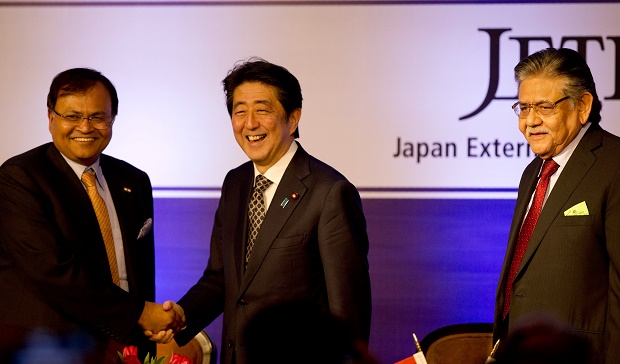
Japanese Prime Minister Shinzo Abe, center, shakes hands with Sunil Kanoria, president of the Associated Chambers of Commerce and Industry of India, as Confederation of Indian Industry President Sumit Mazumder, right, watches during the Japan India Innovation Seminar in New Delhi, India Friday, Dec. 11, 2015. Indian Prime Minister Narendra Modi hopes the visit of Abe will be a major step in transforming India into an economic powerhouse with Japan’s help in building bullet trains, “smart cities” and nuclear technology exchange. AP Photo
NEW DELHI, India—Indian Prime Minister Narendra Modi and his Japanese counterpart Shinzo Abe are expected to discuss deals covering high-speed rail, defence and civilian nuclear technology when they hold talks on Saturday.
READ: Japan poised to build India’s first bullet train–report
Modi and Abe, both right-wing nationalists, have forged an unusually warm relationship since the Indian leader stormed to power at general elections last year pledging to revive the flagging economy.
The two countries are seeking to take advantage of that friendship, formed partly over their mutual desire to counter regional rival China’s growing influence, during Abe’s two-day visit.
After arriving in New Delhi on Friday afternoon to meet Indian business leaders, Abe is expected to sit down with Modi to make progress on the rail, defence and nuclear deals.
Abe is also expected to take a tour with Modi of India’s holiest city of Varanasi and the premier’s parliamentary constituency.
Posters of the two leaders were seen being thrown up around the sacred city, built on the banks of the Ganges River.
Speaking late Friday after receiving an honorary doctorate from a Delhi university, Abe said Asia’s second and third-largest economies had “the greatest potential of any bilateral relationship in the world.”
Several lucrative business deals are slated for discussion, according to officials, including a $15 billion agreement for Japan to provide India’s first Shinkansen bullet train connecting the cities of Mumbai and Ahmedabad.
Modi has pledged to overhaul India’s ramshackle railways and other infrastructure as part of his ambitious economic reforms.
The pair are expected to discuss India’s desire to buy seaplanes from Japan after Tokyo’s relaxation of restrictions on weapons exports, according to reports.
A long-mooted civil nuclear agreement is also on the agenda, allowing Japan to export nuclear plant technologies to the subcontinent.
Japan once shunned nuclear cooperation with India, which has not ratified the international nuclear Non-Proliferation Treaty, but analysts say Tokyo has since softened its stance.
Abe also wants to strengthen maritime ties with India after the two countries, along with the United States, held joint naval exercises earlier this year.
“In order to maintain an open, free and peaceful sea, it becomes important more and more for there to be collaboration between Japan and India, as well as collaboration with the international community,” Abe wrote in an opinion piece in the Times of India.
Modi and Abe enjoy a close friendship that predates the Indian leader’s election in May last year.
Both were elected on a platform of kick-starting reforms to their economies, and both are at the helm of nations with separate territorial disputes with China.